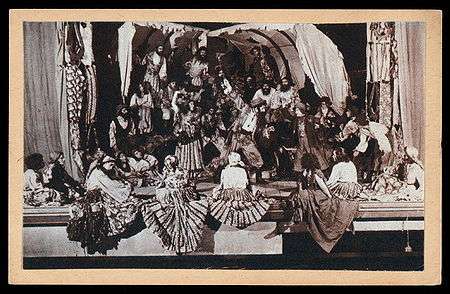Ruska Roma
| Part of a series on |
| Romani people |
|---|
|
Diaspora
|
|

The Ruska Roma (Russian: Руска́ Рома́), also known as Russian Gypsies (Russian: Русские цыгане) or as Xaladitka Roma (i.e. "Gipsy-Soldiers"),[1] are the largest subgroup of Romani people in Russia.[2] Initially known as Ruska Roma, they live mostly in Russia and Belarus, but also in Eastern and Central Ukraine, France, Canada, and the USA.
The Ruska Romani language contains some German, Polish, and Russian words, as well as a small amount of Ukrainian and Russian grammar. Most Ruska Roma are Orthodox Christians, while those living in predominantly Muslim areas (such as the Caucasus) tend to be Muslim.[2]
Their traditional professions include horse trading, music, dancing, and fortune-telling.[2] As of 2016 most Romani singers, actors, dancers, and musicians in Russia are of the Ruska Roma. Their musical culture is considered to be the leading Romani culture in Russia, and is copied by other Roma.
The Ruska Roma traditional clothing is based on Russian and Kalderash traditional clothing, and is used actively by singers and dancers.
Modern Ruska Roma are one of the most educated Romani groups in Russia. They have many professions.[2]
Ruska Roma in Russian history
At the beginning of the 19th century there already existed several Romani choruses consisting of Ruska Roma who were servants. They were considered to be so talented that their owners emancipated them. Romani choruses of Moscow and Saint-Petersburg were very popular during the 19th century. Russian noblemen sometimes married Romani chorus girls.
In Russia, Ruska Roma were mostly nomadic horse traders and singers. They traveled during the summer and stayed in cottages of Russian peasants during the winter. They paid for their lodging with money or with work on the horses. Ruska Roma were very popular among peasants who liked their music and dances and considered Roma to be beautiful.
In 1812, when Napoleon I invaded Russia, the Romani diaspora of Moscow and Saint Petersburg gave large sums of money and good horses for the Russian army. Many young Romani men took part in the war as uhlans.

At the end of the 19th century Rusko Rom Nickolai Shishkin created a Romani theater troupe. One of its plays was in the Romani language.
After the October Revolution, some Romani families left Russia. Some young Romani men took part in the civil war. In the 1920s and '30s, Roma of the Soviet Union produced a literary norm of the Romani language that was based on a dialect of Ruska Roma. Romani literature and press appeared; most of the poets, writers and journalists were from the Ruska Roma. In the 1930s the Roma of the U.S.S.R. were subjected to mass repressions. Romani press and literature were forbidden.
During World War II some of the Ruska Roma entered the army, by conscription and as volunteers. They took part in the war as soldiers, officers, infantrymen, tankmen, artillerymen, aviators, drivers, paramedics and doctors. Some teenagers, old men and adult men were also partisans. Romani actors, singers, musicians, dancers (mostly women) performed for soldiers in the front line and in hospitals. A huge number of Roma, including many of the Ruska Roma, died or were murdered in territories occupied by the enemy, in battles, and in the siege of Leningrad.
After World War II Ruska Roma's music became very popular. Romen Theatre, Romani singers and ensembles prospered. All Roma of the U.S.S.R. began to perceive Ruska Roma's culture as the basic Romani culture. After the Decree of nomadic life interdiction (1956), the second wave of Ruska Romani settling happened.
In the 1980s, some representatives of artistic Ruska Romani families made a considerable contribution to "informal" music: jazz (Valentina Ponomaryova), rock (Valentina Ponomaryova, Mikhail Zhemchuzhny Junior), Russian chanson (Alexei Dulkevich Junior).
In the 1990s, Ruska Roma's music lost its popularity and now have quite a small audience, but is still popular at Russian weddings and birthday celebrations.
Famous Ruska Roma
- Alexei Dulkevich-senior, Alexei Dulkevich-junior, Mikhail Zhemchuzhny-junior, Oleg Ponomaryov — musiсians
- Nikolai Shishkin, Ivan Rom-Lebedev, Nikolai Pankov — theatre personalities
- Valentina Ponomaryova, Dmitry Buzylyov — theatre and cinema actors, singers
- Mikhail Ilyinsky, Alexei Ilyinsky, Ivan Rom-Lebedev — writers
- Stepanida Soldatova, Tatyana Demyanova, Varvara Panina, Alyosha Dimitrievich, Valentina Ponomaryova, Lyalya Shishkova, Vasily Vasilyev, Nickolai Vasilyev, Alyona Buzylyova, Ratmir Shishkov, Diana Savelyeva, Peter Yanyshov — singers
- Natalya Pankova, Lyubov Pankova, Ilona Makhotina — scientists
- Djura Makhotin — poet
- Yan Reshetnikov — human rights activist, general of police
See also
References
- ↑ "Roma and 'Gypsies'". Retrieved 2016-02-11.
Ruska Roma [...] Also called 'Xaladitka Roma' (Gypsy soldiers), they are the most numerous group in Russia. These are probably the first Roma who settled in that land, likely coming from the Caucasus, and they speak an Old Romany language. They are widespread throughout Russia even up to the Kamchatka Peninsula and across the boundaries with China, as well as in Ukraine, and some of them beyond the western border, in Poland. The Ruska Roma are an endogamic group and keep the Romany Law.
- 1 2 3 4 Nomadic people. N.Bessonov. National Geographic Russia, April 2007
External links
- The passion of the Roma à la russe
- The Kolpakov Trio Brings The Roma Renaissance
- About Ruska Roma's costume, with photos
| ||||||||||||||||||||